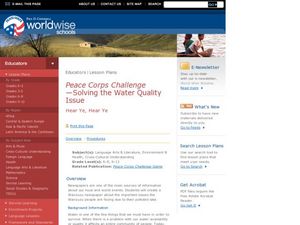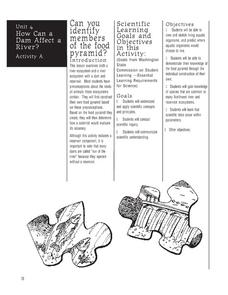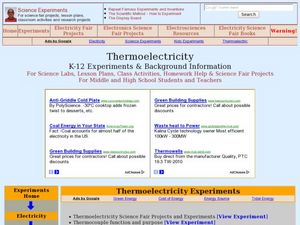Scholastic
Recovery From Drug Addiction
Are there factors that put some individuals at a higher risk for drug addiction than others? Learn more about the risk factors that may make some people more susceptible to addiction, as well as protective factors that help prevent...
Rockefeller Archive Center
Understanding Mass Media News
In an age of fake news and photoshopped images, it is vital that 21st century learners development the skills they need to evaluate mass media and assess its validity. A great way to launch such a study is with a carefully crafted lesson...
Curated OER
Riding on a Pendulum
A comprehensive resource gets fourth grade physical scientists making observations about the period of a pendulum and then applying knowledge to a playground swing. Through seven different stations, they will record observations and...
Environmental Protection Agency (EPA)
How Much Water Do You Use?
Incorporate reading strategies, math, research, and the scientific method into one lesson about water conservation. After reading a story about a landlady trying to determine how many people are living in an apartment, learners develop a...
Baylor College
What Is the Water Cycle?
Small groups place sand and ice in a covered box, place the box in the sunlight, then observe as evaporation, condensation, and precipitation occur. These models serve as miniature water cycles and demonstrations of the three phases of...
Baylor College
Pre-Assessment Activity: What Do You Know About Microbes?
In an introductory lesson, youngsters take a pre-assessment quiz, get a grasp of a gram of mass, and then estimate the mass of microorganisms that live within a human body. Using Glo Germ™, a material that allows you to simulate the...
Baylor College
Observing Different Microbes
Following directions from a colorful slide preparation card, beginning biologists examine three different live microorganisms: bacteria, yeast, and paramecia. This is not an unusual activity to do with your class, but if you are doing it...
Baylor College
Infectious Disease Case Study
Small groups of life science learners look at Allison's symptoms and discuss a diagnosis. They use a chart of illnesses and draw symptom clues from an envelope to determine what illness she has. A instructional activity like this gives...
Baylor College
There's Something in the Air
Clever! In order to compare indoor and outdoor dispersal rates for the movement of gases and particles through air, collaborators will participate in a classroom experiment. Set up a circular grid and set students on lines that are...
Arts Midwest
The Joy Luck Club: Culture and History
Explore San Francisco's Chinatown in a instructional activity about the first few chapters of The Joy Luck Club by Amy Tan. Kids research Chinatown on the Internet and create a virtual tour of the neighborhood, including the foods,...
Cornell University
Buoyancy
Swimmers know to float by turning their bodies horizontally rather than vertically, but why does that make a difference? In an interesting lesson, scholars explore buoyancy and the properties of air and water. They test cups to see which...
Curated OER
Habitat Basics
First graders get out and explore two different habitats to examine how each one meets the needs of the plants and animals that dwell there. They discuss what they've learned about animal habitats as they explore the outdoor environment....
Rice University
College Physics for AP® Courses
Take a look at an organized physics course. The 34-section electronic textbook covers material in AP® Physics 1 and 2. Teachers use the text to supplement lectures and have the class work through the labs. Each section contains...
WindWise Education
Are Birds Impacted by Small Wind Turbines?
How do we know if the wind turbine at our school is impacting birds? Here, small groups work together and conduct field work in order to determine the impact of a human-made structure on birds. The groups also determine their searcher...
Curated OER
Make a Windmill
Students explore Earth science by conducting an energy experiment in class. In this windmill lesson, students identify how wind has been used to pump water throughout history and the latest developments wind energy has produced. Students...
Curated OER
How to Grow a Sunflower Plant
Students explore botany by conducting a sunflower growth experiment. In this plant life lesson, students identify the anatomy of a sunflower plant and the essential nutrients it requires to grow. Students utilize compost, soil, garden...
Curated OER
Peace Corps Challenge—Solving the Water Quality Issue
Students create a Wanzuzu newspaper. In this Peace Corps lesson plan, students participate in a discussion regarding water pollution in Wanzuzu. Students conduct further research about the issue and create newspapers that detail the...
Curated OER
WebQuest: The Growing Challenge in Senegal
Students examine the issue of soil infertility in Senegal. In this agriculture lesson, students follow the steps to complete the provided webquest that requires them to learn about the issue and create a 3-year plan for planting in...
Foundation for Water & Energy Education
How Can a Dam Affect a River? Activity A
Written for Washington state students in life science, this lesson provides an opportunity to examine the residents of local freshwater habitats. You or the class collects a water sample, and learners try to examine what organisms live...
Curated OER
Let's Light up a Light Bulb
Third graders investigate electricity. For this electricity lesson, 3rd graders observe a familiar battery-operated toy and brainstorm reasons why and how the battery works. Students work in pairs to explore batteries, bulbs,...
Curated OER
An Oceanographic Proxy
Students conduct experiments on a sample of sea water. In this oceanography lesson, students inquire how conductivity is used to approximate the salinity ocean water. Students construct their own conductivity meters and test...
Curated OER
TE Activity: Hot Cans and Cold Cans
Students work on problems in which they investigate conduction, convection, and radiation. They attempt to maintain the warmth in one can of soda while cooling the other as much as possible in a thirty minute period. They examine how...
Curated OER
Thermoelectricity
Students conduct a series of experiments on thermoelectricity. In this physics lesson, students investigate how thermocouple works. They determine the voltage generated when different conductive materials are held at different temperatures.
Curated OER
Simulating the Greenhouse Effect in a Terrarium
Students identify what factors effect global warming and how the greenhouse effect occurs. In this environmental lesson students view videos then complete an experiment using a terrarium to observe greenhouse gas.

























